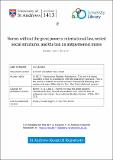Norms without the great powers: international law, nested social structures, and the ban on antipersonnel mines
Abstract
In the past two decades, a series of major multilateral treaties were created in the absence of support—and often in the face of sustained opposition—from the United States and other emerging global leaders like China, India, and Russia. These institutions present a puzzle to prominent theories of IR because they fail to encompass predominantly powerful actors regarded as most consequential to the development and enforcement of international rules, raising questions as to their potential efficacy. This paper addresses the prospects for non-great power law in theoretical and empirical terms. I first draw on constructivist conceptions of international law as a social practice to demonstrate how multilateral treaties may generate powerful new social expectations and alter behavior even when they do not correspond to the prevailing distribution of material power in the international system. Treaties are embedded within an international social system composed of legal and non-legal elements, and these structural features generate social pressures that bear on formal members and non-parties alike. I then apply this account to an archetypal—and hard—case, the ban on antipersonnel mines. Contrary to skeptical assumptions, I demonstrate that the Mine Ban Treaty has instantiated a powerful new international social standard which has generated widespread behavioral change among treaty members—challenging accounts that emphasize enforcement by leading states—and non-parties including major military powers like the United States—challenging the view that great powers avoid new institutional developments not to their liking.
Citation
Bower , A S 2015 , ' Norms without the great powers: international law, nested social structures, and the ban on antipersonnel mines ' , International Studies Review , vol. 17 , no. 3 , pp. 347-373 . https://doi.org/10.1111/misr.12225
Publication
International Studies Review
Status
Peer reviewed
Type
Journal article
Collections
Items in the St Andrews Research Repository are protected by copyright, with all rights reserved, unless otherwise indicated.

